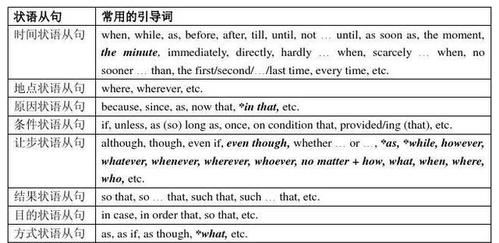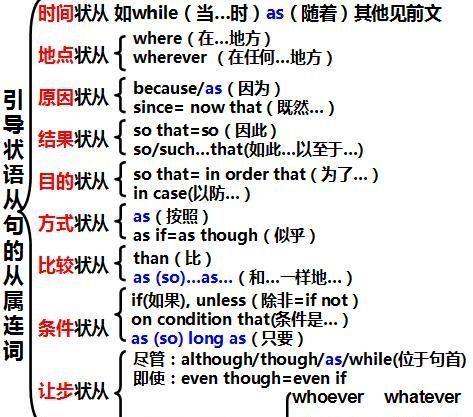本文目录
状语从句和定语从句的区别
一、状语从句和定语从句的区别
状语从句和定语从句的区别是:从句修饰主句谓语的是状语从句,从句修饰主句中的名词性成分的是定语从句。状语从句,是从句的形式做状语,修饰的是主句的谓语动词。定语从句,是从句的形式做定语,修饰的是主句中的某个名词、代词。
二、英语中什么是定语从句和状语从句
定语从句是由关系代词和关系副词引导的从句,其作用是作定语修饰主句的某个成分,定语从句分为限定性和非限定性从句两种。状语从句分为时间状语从句,结果状语从句,让步状语从句,原因状语从句,条件状语从句以及行为方式状语从句。名词从句包括主语从句,宾语从句,表语从句和同位语从句及there be句型。
限定性定语从句:
1. that即可代表事物也可代表人,which代表事物;它们在从句中作主语或宾语,that在从句中作宾语时常可省略关系词,which在从句中作宾语则不能省略。而且,如果which在从句中作“不及物动词+介词”的介词的宾语,注意介词不要丢掉,而且介词总是放在关系代词which的前边,但有的则放在它原来的位置
2. which作宾语时,根据先行词与定语从句之间的语义关系,先行词与which之间的介词不能丢
3. 代表物时多用which,但在带有下列词的句子中用that而不用which,这些词包括all, anything, much等,这时的that常被省略
4. who和whom引导的从句用来修饰人,分别作从句中的主语和宾语,whom作宾语时,要注意它可以作动词的宾语也可以作介词的宾语
5. where是关系副词,用来表示地点的定语从句
6. when引导定语从句表示时间
〔注〕值得一提的是,表示时间“time"一词的定语从句只用when引导,有时不用任何关系代词,当然也不用that引导
By the time you arrive in London, we will have stayed there for two weeks.
I still remember the first time I met her.
Each time he goes to besiness trip, he brings a lot of living necessities, such as towers, soap, toothbrush etc.
7. whose是关系代词,修饰名词作定语,相当于所修饰成分的前置所有格
8. 当从句的逻辑主语是some, any, no, somebody, anybody, nobody, something, anything, everything或nothing时,常用there is来引导
非限定性定语从句:非限定性定语从句的作用是对所修饰的成分作进一步说明,通常和主句间用逗号隔开,将从句拿掉后其他部分仍可成立
1. which引导的非限定性定语从句来说明前面整个句子的情况或主句的某一部分
2. 在引导限定性定语从句时,that有时相当于in which, at which, for which或at which
Attitudes towards daydreaming are changing in much the same way that(in which) attitudes towards night dreaming have changed. 人们对白日做梦的态度正在改变,这与人们对夜间做梦的看法的变化有非常相似之处。
I like the music for the very reason that(for which) he dislike it. 我出于某种原因喜欢这种音乐,而他恰恰与我相反。
We arrived the day that(on which) they left. 刚好我们到的那天他们走了。
3. 有时as也可用作关系代词
4. 在非限定性定语从句中,不能用that,而用who, whom代表人,用which代表事物
状语从句
§ 1状语从句的种类
用来修饰谓语动词、其它动词、定语、状语或整个句子的从句叫做状语从句。状语从句可分为:
1.时间状语从句;(adverbial clause of time)
2.地点状语从句;(adverbial clause of place)
3.原因状语从句;(adverbial clause of cause)
4.条件状语从句;(adverbial clause of condition)
5.目的状语从句;(adverbial clause of purpose)
6.让步状语从句;(adverbial clause of concession)
7.比较状语从句;(adverbial clause of comparison)
8.程度状语从句;(adverbial clause of degree)
9.方式状语从句;(adverbial clause of manner)
10.结果状语从句。(adverbial clause of result)
§2状语从句的时态特点
一般情况下,时间和条件状语从句的谓语动词一般用“一般现在时”表示“一般将来时”,用“现在完成时”表示“将来完成时”。例如:
I will call you as soon as I arrive in Beijing. 我一到北京就给你打电话。(这是由as soon as引导的时间状语从句,从句中的谓语动词arrive是一般现在时,表示一般将来时,决不可用will arrive)
As soon as I have finished this work, I will go home. 我一完成此工作,就回家。(从句中的谓语动词用现在完成时have finished,表示将来完成时,决不可用will have finished)
If he comes back, please let me know.如果他回来了,请通知我。(从句中的谓语动词用comes back,表示一般将来时,决不可用will come back)
时间状语从句:
§3时间状语从句(adverbial clause of time)
1.由when, while, as引导的时间状语从句。例如:
When you think you know nothing, then you begin to know something.当你以为自己一无所知的时候,你就是在开始知道一些事物了。
When truth is buried under the ground it grows, it chokes, it gathers such an explosive force that on the day it bursts out , it blows up everything with it.当真理被埋在地下的时候,它在生长,它感到压抑,它蓄存着这么一种爆炸性力量,一旦冒出,它就会炸破一切!
Strike while the iron is hot. 趁热打铁。
Will you watch my clothes while I have a swim. 我游泳的时候,请你照看一下我的衣服。
You can feel the air moving as your hand pushes through it. 当你的手在空气中挥动的时候,你就能感觉到空气在流动。
Our headmaster laughed as she spoke.我们的校长边谈边笑。
【区别】when, while和as的区别:when引导的从句的谓语动词可以是延续性的动词,又可以是瞬时动词。并且when有时表示“就在那时”。例如:
When she came in, I stopped eating.她进来时,我在吃饭。(瞬时动词)
When I lived in the countryside, I used to carry some water for him.当的住在农村时,我常常为他担水。(延续性的动词)
We were about to leave when he came in.我们就要离开,就在那时他进来了。
While引导的从句的谓语动作必须是延续性的,并强调主句和从句的动作同时发生(或者相对应)。并且while有时还可以表示对比。例如:
While my wife was reading the newspaper, I was watching TV. (was reading是延续性的动词,was reading和was watching同时发生)
I like playing football while you like playing basketball.我喜欢踢足球,而你喜欢打篮球。(对比)
As表示“一边……一边”,as引导的动作是延续性的动作,一般用于主句和从句动作同时发生;as也可以强调“一先一后。例如:
We always sing as we walk.我们总是边走边唱。(as表示“一边……一边”)
As we was going out, it began to snow.当我们出门时,开始下雪了。(as强调句中两个动作紧接着先后发生,而不强调开始下雪的特定时间)
2.由before和after引导的时间状语从句。注意before引导的从句不再用否定式的谓语,并且当before引导的从句位于主句之后,有时译成“就,才”。还要注意主句和从句之间的时间关系。当主句用将来时,从句总是用现在时;如果before引导的从句谓语用的是过去时,则主句动词多用过去完成时,这样以便体现动作发生的先后。After表示主句动作发生在从句动作之后。主句和从句的动作的时间关系正好与before引导的从句相反。例如:
It will be four days before they come back. 他们要过四天才能回来。
Einstein almost knocked me down before he saw me.爱因斯坦几乎把我撞倒才看到我。
My father had left for Canada just before the letter arrived.我父亲恰好在信到之前去加拿大了。
They had not been married four months before they were porced. 他们结婚还不到四个月就离婚了。
After you think it over, please let me know what you decide.你仔细考虑过以后,告诉我你是怎样决定的。
After we had finished the work, we went home.完成工作之后,我们回家了。(从句用过去完成时,主句用一般过去时)
3.由till或until引导的时间状语从句。till和until一般情况下两者可以互换,但是在强调句型中多用until。并且要注意的是:如果主句中的谓语动词是瞬时动词时,必须用否定形式;如果主句中的谓语动词是延续性动词时,用肯定或否定形式都可以,但表达的意思不同。例如:
I didn't go to bed until(till) my father came back.直到我父亲回来我才上床睡觉。
It was not until the meeting was over that he began to teach me English.直到散会之后他才开始教我英语。
I worked until he came back.我工作到他回来为止。
I didn't work until he came back.他回来我这才开始工作。
Please wait until I arrived.在我到达之前请等我。
4.由since引导的时间状语从句。 since引导的从句的谓语动词可以是延续性的动词,又可以是瞬时动词。一般情况下,从句谓语动词用一般过去时,而主句的谓语动词用现在完成时。但在It is +时间+since从句的句型中,主句多用一般现在时。例如:
I have been in Beijing since you left. 自从你离开以来,我一直在北京了。
Where have you been since I last saw you? 自上次我和你见面以后,你到哪里去了?
It is four years since my sister lived in Beijing. 我妹妹不在北京住有四年了。
It is five months since our boss was in Beijing.我们老板离开北京有五个月了。
5.由as soon as, immediately, directly, instantly, the moment, the instant, the minute, 等引导的时间状语从句。这些连词都表示“一……就”。例如:
I will go there directly I have finished my breakfast. 吃完早饭,我立即到那里去。
The moment I heard the news, I hastened to the spot.我一听到消息,马上赶到了出事地点。
As soon as I reach Canada, I will ring you up. 我一到加拿大,就给你来电话。
【注意】hardly(scarcely, rarely)…when / before, no sooner…than相当于as soon as之意。主句用过去完成时,从句用一般过去时。当hardly, scarcely, rarely和no sooner位于句首时,主句应用倒装语序。例如:
He had no sooner arrived home than he was asked to start on another journey. 他刚到家,就被邀请开始另一旅程。
No sooner had the sun shown itself above the horizon than he got out of bed to commence work.太阳刚从地平线上升起,他就起床劳动去了。
Hardly had I sat down when he stepped in.我刚坐下,他就进来了。
He had hardly fallen asleep when he felt a soft touch on his shoulder.这个阿拉伯人刚要入睡就感到肩膀上被轻轻一触。
6.由by the time引导的时间状语从句。注意时态的变化:在一般情况下,如果从句的谓语动词用一般过去时,主句的谓语动词用过去完成时;如果主句的谓语动词用一般现在时,主句的谓语动词用将来完成时。例如:
By the time you came back, I had finished this book.到你回来时,我已经写完这本书了。
By the time you come here tomorrow, I will have finished this work. 你明天来这儿的时候,我将已经完成此工作了。
7.由each time, every time和whenever引导的时间状语从句。例如:
Each time he came to Harbin, he would call on me. 他每次来哈尔滨,总是来看我。
Whenever that man says“To tell the truth”, I suspect that he's about to tell a lie.每当那个人说“说实在话”的时候,我猜想他就要说谎了。
You grow younger every time I see you. 每次遇到你,见你更年轻了。
8.由as long as和so long as引导的时间状语从句。这两个连词表示“有多久……就多久”。例如:
You can go where you like as long as you get back before dark. 你可以随意到哪里去,只要在天黑以前回来就行。
I will fight against these conditions as long as there is a breath in my body! 只要我一息尚存,我就要反对这种境况。
地点状语从句:
§4地点状语从句 (adverbial clause of place)
地点状语从句一般由连接副词where, wherever等引导,已经形成了固定的句型,例如:
句型1:Where+地点从句,(there)+主句。
【注意】此句型通常译成“哪里……哪里就……”;主句在从句后面时,there可用可不用;如果主句在从句的前面时,一般都不用there。例如:
Where there is no rain, farming is difficult or impossible.在没有雨水的地方,耕作是困难的,或根本不可能的。
They were good persons. Where they went, there they were warmly welcomed. 他们都是好人。因此他们走到哪里都受到热烈欢迎。
You should have put the book where you found it. 你本来应该把书放回原来的地方。
Where the Communist Party of China goes, there the people are liberated.哪里有了中国共产党,哪里人民得解放。
句型2:Anywhere/ wherever+地点从句,+主句。
【注意】anywhere本身是个副词,但是,常可以引导从句,相当于连词,意思相似于wherever, anywhere引导的从句可位于主句之前,也可以位于主句之后。 而wherever本身就是个连词,表示“在何处,无论何处”。例如:
Wherever the sea is , you will find seamen.有海就有海员。
;
when定语从句和时间状语从句的区别
区别如下:
定语从句是由关系代词和关系副词引导的从句,其作用是作定语修饰主句的某个成分,定语从句分为限定性和非限定性从句两种。
状语从句分为时间状语从句,结果状语从句,让步状语从句,原因状语从句,条件状语从句以及行为方式状语从句。名词从句包括主语从句,宾语从句,表语从句和同位语从句及there be句型。

状语从句:
时间状语从句:
引导词: when,while, as,after,before,since,until,as soon as, before,after。
When you think you know nothing, then you begin to know something。
地点状语从句:
where,wherever引导。地点状语从句与定语从句的区别, where引导定语从句时,从句前应有一个表示地点的名词作先行词;而状语从句前则无需先行词。
原因状语从句:
Tomwaslate becausehe wasbadly ill yesterday.引导词有because, as, since, for,, seeing (that), now (that), considering(that), in that。
定语从句:
由关系词引导修饰先行词的从句:
1.“先行词”与“关系词”的内在联系是互等、互换的关系。
2.“先行词”的选择是由“先行词”自身表达的意义,及它在从句中的语法功能而决定的。如:是“人”还是“物”的意义。
怎样判断定语从句和状语从句举例
从句修饰主句谓语的是“状语从句”,从句修饰主句中的名词性成分的,是“定语从句”。“状语从句”是从句的形式做状语,修饰的是主句的谓语动词;而“定语从句”,是从句的形式做定语,修饰的是主句中的某个名词、代词。
“定语从句”是指一类由关系词引导的从句,因为这类从句的句法功能多是做定语,所以曾被称为定语从句,这类从句除了可以做定语之外,还可以充当状语等其他成分,所以现代语言学多使用“关系从句”这一术语。
“状语从句”根据其作用可分为时间、地点、原因、条件、目的、结果、让步、方式和比较等从句。状语从句一般由连词(从属连词)引导,也可以由词组引起。从句位于句首或句中时通常用逗号与主句隔开,位于句尾时可以不用逗号隔开。

区分定语从句状语从句和宾语从句
一、状语从句
用来修饰主句中的动词,副词和形容词的从句叫状语从句。根据其含义状语从句可分为时间状语从句,地点状语从句,条件状语从句, 原因状语从句,结果状语从句,比较状语从句,目的状语从句,让步状语从句。
1.时间状语从句
(1)时间状语从句常用when, as, while, before, after, since, till, until, as soon as等连词来引导。例如:
It was raining hard when got to school yesterday.
While he was doing his homework, the telephone rang.
As he walked along the lake, he sang happily.
He had learned a little Chinese before he came to China.
After he finished middle school, he went to work in a factory.
(2)在时间状语从句里,通常不用将来时态,用现在时态表示将来的动作或状态。例如:
I’ll ring you up as soon as I get to New York.
I will tell him everything when he comes back.
He won’t believe it until he sees it with his own eyes.
(3)在带有till或until引导的时间状语从句的主从复合句里,如果主句用肯定式,其含义是“一直到……时”,谓语动词只能用延续性动词。如果主句用否定式,其含义是“直到……才……”, “在……以前不……”, 谓语动词可用瞬间动词。例如:
The young man read till the light went out.
Let’s wait until the rain stops.
We won’t start until Bob comes.
Don’t get off until the bus stops.
2.条件状语从句
(1)条件状语从句通常由if, unless引导。例如:
What shall we do if it snows tomorrow?
Don’t leave the building unless I tell you to.
(2)在条件状语从句里,谓语动词通常用现在时态表示将来的动作或状态。例如:
I’ll help you with your English if am free tomorrow.
He won’t be late unless he is ill.
(3)“祈使句 + and (or)+ 陈述句” 在意思上相当于一个带有条件状语从句的复合句。例如:
Hurry up, or you’ll be late.
=If you don’t hurry up, you’ll be late.
Study hard and you will pass the exam.
=If you study hard, you will pass the exam.
3.原因状语从句
(1)原因状语从句通常由because, since, as引导。例如:
He didn’t come to school because he was ill.
As it is raining, we shall not go the zoo.
Since you can’t answer the question, I’ll ask someone else.
(2)because表示直接原因,语气最强。Because引导的原因状语从句多放在主句之后。回答由why提出的问题,只能用because。As和since语气较弱,一般用来表示明显的原因。由as和since引导的原因状语从居多放在句首。例如:
------Why aren’t going there?
------Because I don’t want to.
As he has no car, he can’t get there easily.
Since we have no money, we can’t buy it.
(3)because和so不能同用在一个句子里。
4.结果状语从句
(1)结果状语从句由so…that, such…that, so that引导。例如:
He is so poor that he can’t buy a bike for his son.
She is such a good teacher that everybody likes her.
My pencil fell under the desk, so that I couldn’t see it.
(2)so…that语such...that可以互换。例如:
在由so...that引导的结果状语从句中,so是副词,与形容词连用。其结构是:“...so+ 形容词(副词)+that +从句”。例如:
He was so glad that he couldn’t say a word.
The hall is so big that it can hold 2,000 people.
Mother lives so far away that we hardly ever see her.
在由such…that引导的结果状语从句中,such是形容词,它修饰的可以是单数或复数可数名词,也可以是不可数名词;名词前面可以带形容词,也可不带。如果是单数可数名词,前面需加不定冠词a或an。例如:
It was such a hot day that nobody wanted to do anything.
He had such long arms that he could almost touch the ceiling.
He made such rapid progress that he did very well in the mid-term.
有时上述两种结构是可以互换的。例如:
It was such a wonderful film that all of us wanted to see it again.
=The film was so wonderful that all of us wanted to see it again.
It is such an important match that nobody wants to miss it.
=The match is so important that nobody wants to miss it.
(3)如果名词前由many, much, little, few等词修饰时,只能用so,不用such。例如:
Soon there were so many deer that they ate up all the wild roses.
He has so little time that he can’t go to the cinema with you.
5目的状语从句
(1)目的`状语从句通常由so that, in order that引导。例如:
We started early so that we could catch the first train.
He studies hard so that he could work better in the future.
We used the computer in order that we might save time.
(2)so that既可引导目的状语从句,又可引导结果状语从句。区别这两种从句的办法有两个:1)目的状语从句里往往带有情态动词can, could, may, might等。2)从意思上看,目的状语从句往往表示的目的很明确。例如:
Speak clearly so that they may understand you. (目的状语从句)
Jack is badly ill so that he has to rest. (结果状语从句)
6.让步状语从句
(1)让步状语从句通常由although, though等连词引导。例如:
Though he is young, he knows a lot.
Although I am tired, I must go on working.
(2)although(though)不能用在同一个句子中。例如:
我们不能说:Though it was raining hard, but he still went out.
应该说:Though it was raining hard, he still went out.或It was raining hard, but he still went out.
7.地点状语从句
地点状语从句常常由where来引导。例如:
Go where you like.
Where there is a will, there is a way.
二、定语从句
(一)定语从句的功用和结构
在复合句中,修饰某一名词或代词的从句叫做定语从句。被定从句修饰的词叫做先行词。定语从句必须放在先行词之后。引导定语从句的关联词有关系代词和关系副词。例如:
This is the present that he gave me for my birthday.
Do you know everybody who came to the party?
I still remember the night when I first came to the village?
This is the place where Chairman Mao once lived.
(二)关系代词和关系副词的功用
关系代词和关系副词用来引导定于从句,在先行词和定语从句之间起纽带作用,使二者联系起来。关系代词和关系副词又在定语从句中充当一个成分。关系待客做主语,宾语,定语,关系副词可作状语。
1.作主语:关系代词在定语从句中作主语时,从句的谓语动词的人称和数须和先行词一致。例如:
I don’t like people who talk much but do little.
The cars which are produced in Hubei Province sell very well.
2.作宾语:
She is the person that I met at the school gate yesterday.
The book that my grandmother gave me is called “The Great Escape”.
3.作定语
关系代词whose在定语从句中作定语用。例如:
What’s the name of the young man whose sister is a doctor?
The girl whose father is a teacher studies very hard.
4.作状语
I’ll never forget the day when I first came to Beijing.
This is the house where I was born.
(三)各个关系代词和关系副词的具体用法
1. who 指人,在定语从句中作主语。例如:
The person who broke the window must pay for it.
The boy who is wearing the black jacket is very clever.
2. whom指人,在定语从句中作宾语。例如:
Do you know the young man (whom) we met at the gate?
Mr Lee (whom) you want to see has come.
3. which指物,在定语从中作主语或宾语。例如:
A dictionary is a book which gives the meaning of words.
Here is the book (which) the teacher mentioned yesterday.
4. that多指物,有时也指人,在定语从句中作主语或宾语。例如:
I’ve read the newspaper that(which) carries the important news.
Who is the person that is reading the newspaper over there?
I’ll never forget the time when we worked on the far.
He arrived in Beijing on the day when I left.

以上就是关于如何判断状语从句和定语从句 ,状语从句和定语从句的区别的全部内容,以及如何判断状语从句和定语从句 的相关内容,希望能够帮到您。

